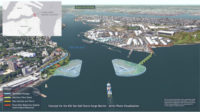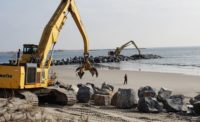Army Corps Shapes Distinguished Career

Carl Sciple reflected on his military service while accepting the ENR New England Legacy Award in December.
PHOTO BY DAVID FOX FOR ENR

Sciple, a former CMAA New England president, was introduced as the Legacy Award winner by Kay Barned-Smith, the current CMAA New England president.
PHOTO BY DAVID FOX FOR ENR

Sciple began his first tour of duty in Vietnam in Cam Ranh Bay in the summer of 1966.
PHOTO COURTESY OF CARL SCIPLE



Whether he was employed in the public or private sector, Carl Sciple drew on lessons learned in nearly a quarter century as an officer in the U.S. Army Corps of Engineers. Before working as an engineer and in management positions on the federal and state levels, the West Point graduate, who served two tours in Vietnam, encouraged soldiers to make their own decisions.
“That’s dangerous, some would say, because if you encourage a person to use initiative, they might make a bad decision,” said Sciple while accepting the 2016 ENR New England Legacy Award on Dec. 8 in Boston. “But you know something, nine times out of 10, they make a great decision, and it’s worth giving them the confidence to take a chance to do something.”
The 77-year-old leader regularly offered such advice to his colleagues until he retired in December from MOCA Systems. Working out of the firm’s Boston-area office, he served as Northeast director for the design and construction software development firm. Previously, Sciple had spent 23 years working for the Massachusetts Port Authority and taught construction management at Wentworth Institute of Technology.
He mentored dozens of young professionals and is a lifelong member and past president of the Society of American Military Engineers Boston Post. He has served on the Harvard Historical Society and the Wetlands Protection Committee in Wellesley, Mass. He also is past chair of the Construction Manager Certification Institute. Sciple recently stepped down from the board of the Construction Management Association of America’s New England Chapter; he helped found the group in 1995 and served as its president. The chapter honored him with several awards, including its Distinguished Service Award in 2008 and 2012.
Current CMAA New England President Kay Barned-Smith says Sciple is “encouraging, supportive of his teammates and his staff and always full of helpful information.”
Military Life
Born into a military family in Ayer, Mass., Sciple moved around before his parents separated in the late 1940s. He spent his formative years living with his mother in Cornwall-on-Hudson near the U.S. Military Academy in West Point, N.Y. Sciple eventually graduated from the academy in 1961 and then was stationed in Germany for three years. He returned stateside in 1965 to attend the University of California, Berkeley, where he earned a graduate degree in civil engineering.
“It was totally different,” Sciple says of attending UC Berkeley as a military officer during the Vietnam War. “I loved my time there, and the students were totally respectful.” Sporting a military crewcut, Sciple says he teased his classmates about having long hair. “I said, ‘I’m the only one here doing my own thing.’”
After graduate school, Sciple was deployed to Vietnam. In 1967, he was the company commander for a unit erecting a “float bridge” across a river in a remote jungle in hostile territory. Sciple’s team flew in the 150-ft-long bridge and had to quickly prepare the river banks and assemble the bridge so that an infantry convoy could cross the river. The convoy included armored personnel carriers containing .50-caliber machine guns.
“We might have had an infantry squad with us, but we were combat engineers, so we had our own firepower,” recalls Sciple, who earned a Bronze Star with two Oak Leaf Clusters for his Vietnam service. “That was probably one of my best projects when I was active army.”
Sciple fondly recalls another Corps project that he didn’t even build: Boston’s Charles River dam and locks. Completed in the late 1970s just before he was stationed there as the division engineer, the project included an earth-filled dam and flood-control pumping station to protect upstream areas from flooding. The system also improved water quality by reducing both salt water intrusion and combined sewage overflows.
When the project won the 1984 Presidential Award for Design Excellence in Architecture, Engineering and Urban Planning, Sciple was invited to the White House to accept the award. White House officials balked when Sciple suggested it was more appropriate to invite the chief of construction in his place. He asked his predecessor, General Ernie Edgar, to attend and was told he should take the credit since he would be blamed if the dam failed. “I went down and I received the award, even though I really wasn’t the person on the front line on that job,” he says.
However, Sciple was responsible for managing more than 600 people at the Corps and working on facility and civil works projects such as the Cape Cod Canal. The canal was built before he was tasked with overseeing it, but, with two highway bridges and one railroad bridge crossing, the canal was “a challenge” to maintain. Sciple ensured that the bridges’ steel remained in good condition and was painted.
He also oversaw erection of 8-ft-tall suicide barriers on the bridges. “It didn’t eliminate suicide, but it was a major factor in reducing suicides,” he says. “[The barrier] was steel, it was thin and strong, and you couldn’t really climb up it.”
Sciple left the Corps in 1985 to work for Massport and ultimately served as the deputy director of the capital programs department. Massport oversees Logan International Airport, from which the planes departed that crashed into the World Trade Center on Sept. 11, 2001. Sciple called 9/11 “a gut check,” but says he’s proud to have helped Logan become the first major U.S. airport to meet the post-9/11 federally mandated deadline for baggage-screening protocols.
By the end of 2002, Massport had implemented a new baggage-screening system, including enhanced and expanded baggage-handling rooms with space for an explosive-detection system. Sciple says many airports at the time complied with the federal mandate using make-shift solutions that cut into public spaces, but Massport’s $146-million project achieved its goals “under the gun” without encroaching on passenger areas.
“We not only had to check individual passengers completely and baggage completely, but we also had to fortify the terminals so that cars couldn’t just drive up and into them,” Sciple says. “There’s subtle protection means that have been incorporated around the terminals and around public facilities so cars and trucks can’t get into them.”
Sciple is also proud to have facilitated Logan’s modernization initiative, a multi-year, $1-billion planning, design and construction program to upgrade terminals, roadways, fueling systems, central cooling and heating plants and electrical substations. “It was a fascinating, complex job on a site that always had to be in operation,” he says.
Sciple also began teaching as an adjunct professor at Wentworth School of Technology in Boston in the early 2000s. After leaving Massport in 2008, he helped develop the school’s first master’s degree program in construction management. Mark Hasso, a Wentworth professor of construction management who won the 2015 ENR New England Legacy Award, says Sciple is one of the “most visible proponents” for the industry who helped establish its “principles and practices. Carl is clearly a professional, mentor, teacher and colleague and he is viewed by his peers as an outstanding leader.”
After leaving Wentworth, Sciple worked for several private-sector firms, including MOCA Systems, where he spent four years. “He treats everyone with respect,” says MOCA President Sandy Hamby. “He is the true definition of an officer and a gentleman.”
On the day he retired seven months ago, Sciple and his wife—who have two children and three grandchildren—moved into a 1795 farm house in Harvard, Mass.
Sciple spends his days fixing up the 2,500-sq-ft house with a barn and carriage house located on a little less than an acre in the middle of town. He also is still managing a construction project. He hired a contractor to build a drainage system in front of the house. After drawing up some of the plans for the system himself, Sciple compared notes with the contractor and ultimately told him, “I want you to make a profit. Just don’t do it too much at my expense.”







